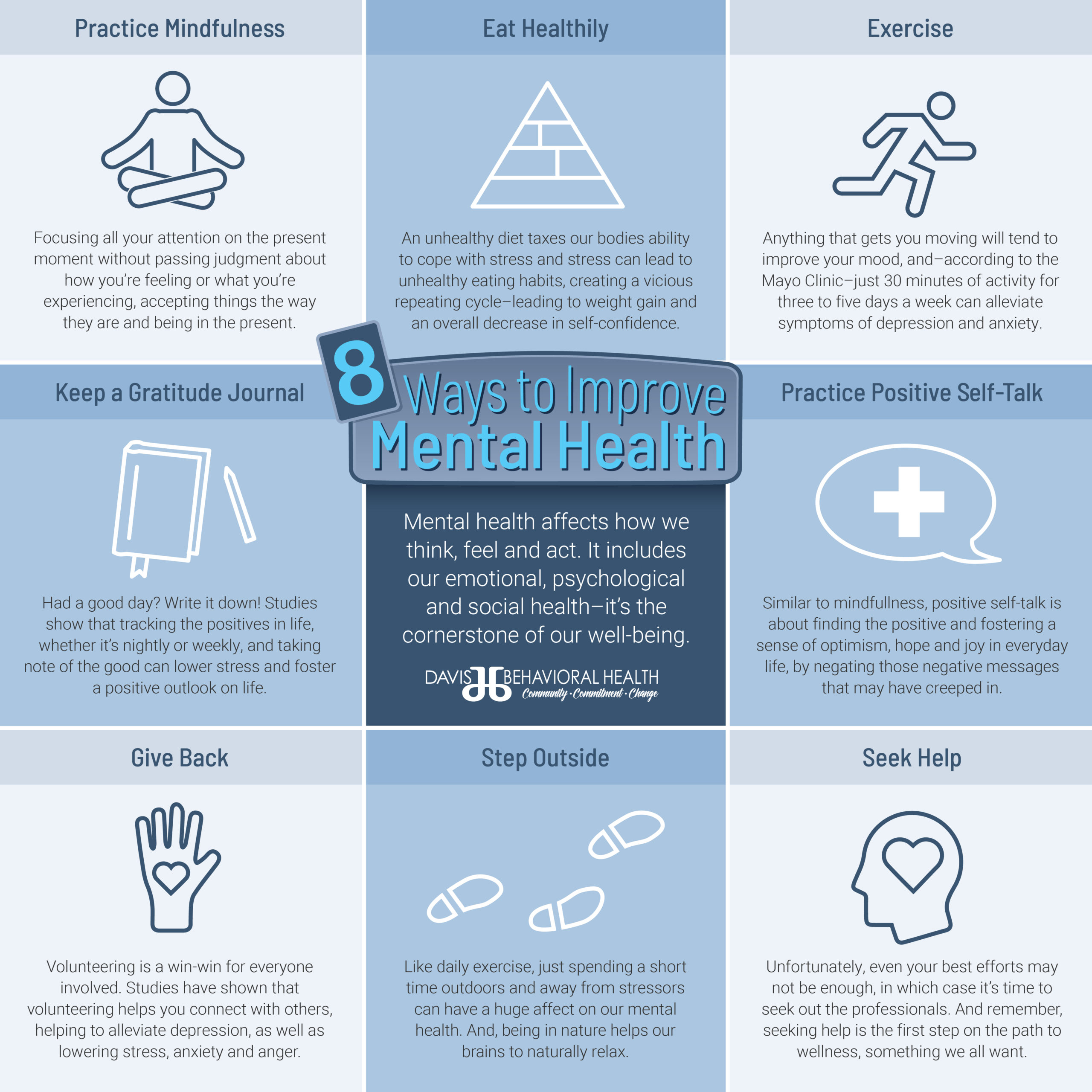Mental health is more than just how you feel, it’s the cornerstone of well-being. It impacts how we interact with family, friends and ourselves. It’s the catalyst and precursor for everything in our lives—both the good and the bad. Mental health affects how we think, feel and act. It includes our emotional, psychological and social health.
If something is important, you treat it differently. It’s hard to imagine a more important component of overall wellness than mental health. So, we’ve provided eight easy things you can do today to improve it.
Practice Mindfulness
Stressed? Anxious? Overwhelmed? Mindfulness can help. This is the practice of focusing all your attention on the present moment without passing judgment about how you’re feeling or what you’re experiencing. It’s a state of accepting things the way they are. It’s alright to have judgments during this time, but practicing mindfulness means you dismiss them as fleeting thoughts; just return to the present moment. Here’s a great tutorial from Mindful to get you started.

Exercise
Exercise stimulates chemicals in the brain that leave you feeling happier, less stressed and more relaxed. And you don’t need a gym membership to reap the rewards of daily exercise. Walk around the block. Pull weeds in your garden. Wash your car. According to the Mayo Clinic, 30 minutes of activity a day for three to five days a week may improve depression or anxiety. Exercise doesn’t have to mean running a 5K. Anything that gets you moving will tend to improve your mood.
Eat Healthily
An unhealthy diet taxes your body’s ability to cope with stress. Conversely, stress can cause unhealthy eating habits. According to a report by the American Psychological Association, people tend to seek high-calorie, high-fat foods during periods of stress. The report indicates that 38 percent of U.S. adults say they have overeaten or eaten unhealthy foods because of stress. And half of those say they engage in unhealthy or overeating once a week or more. This is a vicious cycle, as unhealthy and overeating leads to weight gain and a decrease in self-confidence. The takeaway? Eat a well-balanced diet.

Keep a Gratitude Journal
What are you grateful for? Document the positive in your life. Studies show that maintaining a gratitude journal lowers stress, increases relaxation and fosters a more positive outlook on life. And it doesn’t matter if you document what you’re grateful for every night or once a week. The important thing is to recognize the positives in your life and write them down.
Give Back
Volunteering in the community is a win-win. While helping those in need, you are simultaneously improving your mental health. The social aspect of volunteering connects you with others and helps combat depression. Studies show that volunteering can lower stress, anxiety and anger, all while increasing self-confidence. As an added benefit, most volunteer opportunities require stress-smashing exercise. Don’t know where to start? Luckily, the internet has made it easy to find volunteer opportunities, no matter where you live.
Practice Positive Self-Talk
The internal dialogue that plays repeatedly in our minds can be detrimental to good mental health. Maybe you’re familiar with the negative messages, “I’m not good enough;” “I can’t do it;” “I just want to hide.” Positive self-talk combats these harmful internal thoughts. It can promote optimism, hope and joy. Done right, positive self-talk brings the positive out of the negative and helps you do better, go further or just keep moving forward. Similar to mindfulness, it’s about accepting things as they are, but learning to see the positive—rather than fixating on the negative.

Step Outside
We already talked about how daily exercise can help improve mood, chase away stress and help you relax. But it turns out just being in nature also has mental health benefits. Research shows spending time outdoors activates parts of our brain that helps us relax. If you’re stressed or overwhelmed, go outside. Take a stroll around the block or go to the park for lunch. The point is to just get outside—if only for a few minutes.
Seek Help
In some cases, these suggestions still fall short of achieving optimal mental health and the best thing is to get help. Know that seeking professional counsel isn’t a sign of weakness. Rather, it’s a symbol of self-respect and dignity. From anxiety and depression to substance abuse challenges, Davis Behavioral Health is here to help improve your mental health. After all, it’s the foundation of your well-being.


